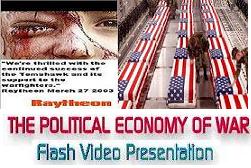
Israel and Palestine in 15 minutes. That will be a real challenge, but I think we can get started. The Israel/Palestine conflict basically begins in the end of the 19th century, when the Zionist movement sets out to create what it calls a Jewish state in Palestine. And in their minds a Jewish state meant a state which was overwhelmingly, if not homogeneously, Jewish.
That's their goal, and their first breakthrough was when they got the backing of the British Empire in 1917, by virtue of what came to be called the Balfour Declaration. Once the Zionist movement had the backing of the British Empire, its main challenge was the indigenous population of Palestine. Because Palestine , not withstanding what Joan Peters, Alan Dershowitz, and others have said, wasn't empty at the end of the 19th century. It was overwhelmingly Christian and Muslim Arab. You could say roughly ten percent of the population was Jewish. And even the ten percent who was Jewish was overwhelmingly, in fact fanatically, anti-Zionist. They didn't believe that you should create a state before the Messiah comes, and so on and so forth.
So the Zionist movement's main obstacle at the end of the 19th century is: What do you do with the indigenous population? And you can conjure up in your mind a thousand different ways to resolve this dilemma, but in the real world there are only two ways to resolve the dilemma. And the two ways are, as the very good Israeli historian Benny Morris put it, either you create an Apartheid-like state—to use Benny Morris's formulation, where a settler minority lords it over and exploits the indigenous majority. That's one possibility, an Apartheid-like arrangement. And the other possibility is to expel the indigenous population.
That's it. You have two possibilities, two options: expulsion or Apartheid. And the Zionist movement, during the first period of conquest of Palestine, roughly the years 1917 to 1948 until the founding of the state of Israel, during that first period of conquest the Zionist movement was committed privately but not publicly to the expulsion of the indigenous population. Now, that particular claim I've made is not fully agreed to by all historians, but you can say there is a growing consensus that for the first period of the conquest of Palestine the Zionist movement was committed to what was called back then (they used euphemisms) "the transfer option": transferring the Arabs out.
Their only concern was to get the timing right, because Ben-Gurion, the main leader of the Zionist movement within Palestine during this period and later the Prime Minister of the state of Israel, said, " Their are certain things you can get away with in what we call revolutionary times that you can't get away with in normal times, and we have to prepare to strike while the iron is hot. When the time comes, when the moment is right, then we strike and accomplish our aim." So their main concern was to get the timing right.
The other thing which is important to keep in mind is that international morality and law, however much we are skeptical about those concepts—and rightfully so—we shouldn't forget that they do have a real impact on the real world. And during this period, what was called the inter-war period, the international community was not altogether hostile to population transfers to resolve ethnic conflicts. There were many examples. Without going into details, the most famous was the population transfer between Turkey and Greece in the 1920's. It was a very bloody affair, very ugly. Turkey expelled about 1.5 million Greeks and the Greeks expelled in turn about a half million Turks. But the international community came to regard it as, "OK, it was ugly, it was brutal, but probably it was for the better that we had this population transfer."
So Israel is now determined to create an Apartheid-like arrangement in the West Bank and Gaza, and by the early 1970s it starts receiving, for reasons which are important but we can't discuss now, crucial support from the United States. That's Israel and the United States. And then there's another trivial actor in this whole thing, it's called the world. And the world proposes a different kind of settlement to the conflict in 1967. First in July 1967 in the [United Nations] General Assembly, and later in the Security Council. They debate the whole question of how to resolve, not yet the Israel/Palestine conflict, but how to resolve the Israel/Arab conflict, because the Palestinians, as a political factor, have not yet emerged. And basically they put forth what's called UN Resolution 242, and UN Resolution 242 basically has two parts. Not so complicated, we won't get hung up on the semantics. The two parts are: Israel must fully withdraw from the West Bank and Gaza—in accordance with the principles of international law it's inadmissible to acquire territory by war—and the neighboring Arab states have to recognize Israel as a state in the region. So basically the formula is full withdrawal by Israel, full recognition by neighboring Arab States.
Beginning in the middle and early 1970s there is a partial modification of that formula—the Palestinians have now emerged as an actor in the international scene—and the formula now is: Israel has to fully withdraw, the neighboring Arab states have to recognize Israel, and, once Israel withdraws, the Palestinians should have the right to exercise self-determination within a state in the West Bank and Gaza. And that came to be called, as most of you probably know, the two-state settlement.
Now what's interesting about the two-state settlement is how remarkably stable it's been for the last 30 years now. By the mid-1970s the PLO—the representative organization of the Palestinians back then—had come on board supporting the two-state settlement, as had all of the Arab states. You may recall, during the first US attack on Iraq, the famous expression by then President Bush Senior, he used to say, "It's not Saddam versus the United States, it's Saddam versus the world." In fact if ever there were a case of ,an isolated country or two versus the world, it's been on the international consensus supporting the two-state settlement.
Let me just quickly give you a couple of examples, because they're quite revealing. You go to, for example, December 1989, just on the eve of the implosion of the Soviet Union, the Soviet Bloc, and so forth. You look at the General Assembly votes on the Israel/Palestine conflict, the vote is 151 to 3. 151 countries supported a two-state settlement, 3 dissents: United States, Israel, and the island state of Dominica. People used to say, "Why Dominica?" I used to say, "Because that's all the dollar could buy back then."
And now we fast forward to the present. What's interesting is, in the past 12 years there have been spectacular changes of world-historic significance in the map. Back then there were 160 or so countries in the world. I think it's 191 now, I'm not sure. In any case, a dramatic increase in the number of countries, the implosion of the Soviet Union and the disappearance of the Soviet Bloc, and so forth. Yet, if you look at the UN resolutions on the Israel/Palestine conflict for the last year, 2002, still on the two-state settlement the vote was 160 to 4. OK, four: the United States, Israel, and the two additional "countries" (no offense) are the Marshall Islands and the Federated States of Micronesia.
Then, if you go down through all the resolutions on the Israel/Palestine conflict—ALL the resolutions—you'll note that the largest number of dissents you get is six: the United States, Israel, the Federated States of Micronesia, the Marshall Islands, and then two countries—Nauru and Tuvalu. You know I teach Political Science, I'm supposed to know something about geography, I'd never heard of Nauru or Tuvalu. All I know about Nauru is it's about a block long and it's main export is phosphate, which it gets from bird droppings. So that's Nauru—you know, this is the Coalition so we should be serious about these places.
The other member of the Coalition is Tuvalu. OK, Tuvalu is an interesting story, because Tuvalu is also an island, and its main problem is it's on the verge of disappearing, because the tide is rising and Tuvalu is going under. Now, it's an interesting story because the reason that Tuvalu's tide is rising is because of global warming. And a reason for global warming is because the United States won't sign the Kyoto Protocol. So what you have, basically, is this: the United States won't sign the Kyoto Protocol, the tide is rising, and as the tide rises Tuvalu is disappearing. Now if Tuvalu disappears, one of Israel's main allies is missing. So it's only a matter of time before Israel convinces the United States to ban Anti-Semitism.
A Buthelezi for Palestine
Basically, the way the matter stood was, the international community has, from the mid-1970s to the present, struggled for the two-state settlement; the United States and Israel have opposed it. Beginning after the first Gulf War, the hope was that the Palestinians and the Arab world had been sufficiently devastated that the Palestinians would plague the Palestinian leadership, and the leadership would be forced to play the role that we wanted. The PLO was disappearing, it was economically and politically crippled after the war. Mr. Arafat and his cronies were desperate, and what the United States and Israel thought was, "Well, what we need is a Nelson Mandela, somebody who had nationalist bona fides. A Nelson Mandela to play the role of a Chief Buthelezi—a Bantustan leader." And they thought that that's what they could get from Mr. Arafat. Desperate as he was, he had the nationalist credentials. He was no Nelson Mandela, but he had nationalist credentials. They thought that now that he was desperate they could get him to play the role of a Buthelezi. And that came to be called the Oslo Peace Process.
What they were doing is, they were testing Arafat, grooming him, to play that role. And then when the truth came, basically the United States and Israel presented Arafat with an ultimatum: either you sign on the dotted line and accept a Bantustan, or you're finished. For whatever reasons—I think the reasons are complicated—Arafat refused to sign the dotted line. And, just as he was a terrorist up to 1993—when they started to groom him as a Bantustan leader he metamorphosed into a great statesman—then in July 2000, and later in January 2001, when he refused to sign on the dotted line, he became a terrorist again. The United States and Israel realized he wouldn't play the role they had assigned to him.
There were a number of intervening events, most crucially the Israeli invasion in April 2002. Without just simply applying massive force, which hadn't yet succeeded, the United States' and Israel's hope was that after the second destruction of Iraq, they could—to use their expression—shock and awe the Palestinians into now playing the Oslo role that was assigned to them. And Oslo was now renamed the Road Map. You have to look at the exact symmetry: first you had the destruction of Iraq in 1991, then immediately begins the Oslo process because they think they have softened up the Palestinians. After the second destruction of Iraq, we now inaugurate the Road Map, hoping that now the Palestinians have been sufficiently softened.
And they have an Idea: "We're getting rid of Arafat because he won't do what we want him to do." So they get rid of him and they replace him with this guy named Abu-Mazen. And Abu-Mazen is just as corrupt as Mr. Arafat, he's just as incompetent as Mr. Arafat, but there is a difference: Mr. Arafat was elected, Mr. Abu-Mazen was not elected. And the polls show that if they were to hold a vote in Palestine he would get about 3 to 5 percent of the vote. Which means, from the American-Israeli perspective, he's the perfect democratic leader for Palestine.
So they brought in Mr. Mazen and they brought in another fellow. Originally the two thugs they had were Mr. Arafat and this guy named Mr. Barghouti, but now they brought in Mr. Mazen and Mr. Dahlan, security chief of Gaza. And they tried it again, hoping that Mr. Mazen would be the one. Mr. Dahlan's responsibility was to crush the Palestinians. And Mr. Mazen's responsibility, because he had the nationalist credentials—he was one of the founders of the PLO, along with Arafat, so he could give at least some sort of a veneer—was he was supposed to sign on the dotted line.
That didn't work. That was a very short-lived experiment. And that's basically where we are today.
The main question now is whether this wall is going to work. There is a very mixed assessment of whether the wall will successfully solve the Israel/Palestine conflict. The Israeli point of view being that it will provide a technical solution to the problem. I don't know and we can't say for certain, but I think that's basically where we are now today. Israel is still committed to that Bantustan settlement of the Israel/Palestine conflict. The world community is still very consistent in supporting the two-state settlement.
The job is now in our hands and we have a challenge, there's no doubt about that. Because we have a peculiar situation now where, while I usually say—rightfully—that the main role is to be played by the Palestinians, I'm more and more convinced that the main role now is going to be played here. If this thing is going to be undone, if their plans are going to be foiled, it's going to be because of us.
I've been speaking non-stop the last few months, and wherever I go there are quite a few Jews in the crowd and really committed wonderful people everywhere. Two days ago I was in Kalamazoo, Michigan, and it was just terrific to see how many people in a fairly small place, from all walks of life, all incomes, all ethnic backgrounds, are committed to the struggle. I think if we keep up the pressure, keep struggling, I think we can win.
It's in fact the case that most of left-wing public opinion, not just mainstream elites, also supported the expulsion of the Arabs in Palestine and their replacement, or displacement, by the Zionist settlers. And that includes the British Labour Party which wasn't a radical party in say, 1944, but it wasn't the joke it is today. And if you were even like Bertrand Russell, who played roughly the same role in the first half of the 20th century as Professor Chomsky did in the second half of the 20th century, he was—a kind of exemplary moral figure—he supported the expulsion of the Arabs in Palestine in an article in 1944. So there was kind of an acceptance in the international community that population expulsions and transfers are, albeit extreme, nonetheless acceptable if circumstances warrant it. Thus the Refugee Problem
Well, come 1948, during the first Arab-Israeli War, the Zionist movement uses the cover of war to carry out the expulsion of the indigenous population. It's more or less what the Serbs did in 1999 when they used the cover of the NATO attack to expel the Kosovars. And at the end of the first Arab-Israeli War the Zionist movement, now the state of Israel, conquered about 80% of Palestine. From the 80% that it conquered they expelled roughly 750,000 Palestinian Arabs, and about 150,000 remain. And, without going into all the history, that's where matters stood up until 1967.
For those of you who aren't familiar with the conflict, just very quickly, when you hear a discussion about the Palestinian refugees it basically, not entirely, but it basically refers to those 750,000 Palestinian Arabs who were expelled in 1948, who settled in the West Bank, Gaza, and places like Jordan and Lebanon and to a lesser extent Syria and elsewhere.
Thus the refugee problem arises after the 1948 war, and Israel conquers all of Palestine except the West Bank and Gaza. In June 1967 there is another Arab/Israeli war and Israeli again uses the opportunity of the war to complete the conquest of Palestine, and by the end of the war they have now conquered the West Bank, conquered Gaza, and they controlled all 100% of Palestine.
However, they now confront the exact same problem as they did at the beginning of the century. Namely, they wanted the land, here referring to the West Bank and Gaza, but they didn't want the people. And what do you do? Here it is quite interesting to watch how international law and morality do come into play. Because now we're talking about 1967 and international law and morality, at the theoretical level, has evolved. And the international community no longer is willing to acquiesce to population expulsions and transfers as a mechanism for resolving ethnic disputes.
Well, you may recall I said at the very beginning that you really only have two options. One is to expel, the other is to create an Apartheid-like settlement. Expulsion is no longer an available option to the Israelis, so they immediately switch gears and they attempt to create an Apartheid-like settlement in the West Bank and Gaza. And it's useful to recall that formula from Benny Morris: he describes the Apartheid-like settlement as, "A settler minority lording it over a large, indigenous, exploited majority." Well, as a thumbnail description of what did happen in the Occupied Territories in the next 30 years it's quite accurate.
This article is from THE EXPERIMENT




Free Counter